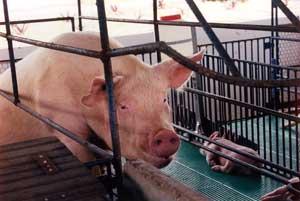Leading Vietnamese agriculture industry representatives traveled to the United States focused on the use of U.S. corn, sorghum, distiller’s dried grains with solubles (DDGS) and corn gluten meal (CGM) in swine rations. An improving economy and an increased demand for pork has driven the growth in Vietnam’s commercial swine sector, intensifying the importance of a quality feed supply.
The team, sponsored by the U.S. Grains Council, was not only afforded opportunities to learn how to utilize U.S. feed grains, but also made purchases of equipment, semen, breeding stock and health products.
“This program, funded through USDA’s Market Access Program, has a record of successfully expanding the demand for U.S. feed grains in commercial diets,� said Thomas C. Dorr, USGC president and CEO. “While the Council works to increase the sale of U.S. corn, barley, sorghum and their co-products, in the process it simultaneously promotes and facilitates the sale of nearly all U.S. agricultural products and technology — a clear benefit to the U.S. economy.�
The animal feed industry in Vietnam is “enjoying an 8-10 percent annual growth rate,� according to a U.S. Department of Agriculture report. Imported corn is very competitive in Vietnam, according to the report. “DDGS has also been used by the Vietnamese feed industry to minimize manufacturing costs, and is therefore a strong competitor to locally grown corn. Vietnam’s feed industry uses mainly DDGS imported from the United States.�
U.S. DDGS exports to Vietnam totaled 254,379 metric tons in 2009 and corn exports totaled 57,249 tons.
Vietnamese attendees rating the two-week program, which included educational sessions at the World Pork Expo, unanimously found the nutrition sessions to be “very beneficial.�
The Council regularly provides managerial and technical training to Vietnamese swine farmers.
“The program itself is instrumental in assisting partner swine producers expand their operations, increase farm sizes and increase the use of feed grains DDGS and CGM in their operations,� Dorr said.


